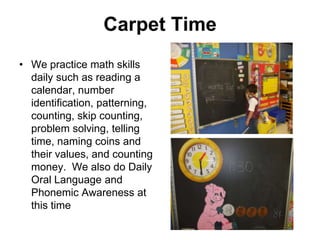Transition first presentation
- 3. Program Description The classroom is designed to be a bridge between Kindergarten and First Grade, for students who may need additional time to strengthen and/or develop the readiness skills that are required to meet the demands of the formal workload of first grade. Students will receive whole group instruction coupled with an individualized curriculum that will be adapted appropriately for each student.
- 4. The primary objectives of the program are: • to give children time to grow • to help the child develop a strong sense of self • to provide an environment rich in equipment and materials, where experiences are direct and concrete • to build a foundation for more abstract experiences in the future • to develop a positive attitude toward learning and school • to more readily prepare students for first grade
- 5. The students will be exposed to the curriculum through a centers based program, as well as guided reading, word building, writing workshop, math, and themed lessons. There will also be instruction to develop positive social emotional behavior as well as to strengthen fine and gross motor skills.
- 6. Specialists Students are divided into groups, and attend specialist classes (P.E., Music, and Connections) with Kindergarten classes. Specialist schedule rotates classes every three days for 3o minutes each day.
- 7. Carpet Time • We practice math skills daily such as reading a calendar, number identification, patterning, counting, skip counting, problem solving, telling time, naming coins and their values, and counting money. We also do Daily Oral Language and Phonemic Awareness at this time
- 8. Circle Time We use music and movement to practice various reading and math skills as well as learning to use self control, listening, following directions, and improvement of gross motor skills
- 9. Guided Reading We complete a variety of literacy stations while Mrs. Peck meets with us individually and in small groups to work on decoding skills and reading strategies
- 10. Making Words • We learn 5 new words each week. We use these words to help us spell other words that sound just like them. We also build words with these sound patterns. We practice reading, spelling writing, and using them in sentences. These words are put on the word wall, and we are expected to spell them correctly in our writing.
- 11. Writing Workshop • After a mini lesson from Mrs. Peck, we write independently at our own level. We conference with the teacher a couple of times per week to improve our writing. All of our important work is kept in our yellow folders. At the end of our writing time we share our work with classmates to show our accomplishments, and to get more ideas to make our writing better.
- 12. Independent Reading • Mrs. Peck reads books to us from different genres, and teaches us what “good readers” do. Then we take our book baskets to a quiet place, and practice our own reading. We choose books for our book baskets each week. 3 books at our level, and 1 Choice book, we take them home to show off our great reading habits. We meet with Mrs. Peck on our reading day and we show her what good readers we are.
- 13. Theme Lesson • We learn about science and Social Studies concepts during this time.
- 14. Centers • During this part of our day we make choices at each center to practice the skills we have learned throughout the day. Mrs. Peck works with us independently or in small groups on skills we need to practice.
- 15. •
- 16. Assessments A variety of Assessments are used, including: • Work Samples, • Teacher Observations, • Anecdotal Records, • Running Records, • ISEL (Illinois Assessment of Early Literacy), • DIBELS (Dynamic Indicators of Early Literacy Skills) • AIMS Web (Math)
- 17. Collaboration • Activities are planned with Kindergarten Teachers, Specialist teachers such as Speech, RtI Interventionist, Social worker, and Reading Recovery Teacher.
- 18. Field Trips We take educational Field Trips related to our Units of Study
- 20. Procedures • Students are taught classroom and school procedures and then practice them together as a class. We review the procedures as necessary throughout the year as needed so each student has the opportunity to know and make good choices throughout the school day.
- 21. Behavior • Each Student has a baseball on the chart. Students earn a star for following procedures for the day. They earn strikes for not following procedures. If a student earns less than 3 strikes at the end of the day, a stamp is put on the behavior calendar in the communication folder. If a student earns 3 or more strikes a note is written in the folder regarding behavior. Students may receive a time out, loss of privilege or office referral depending on the severity of the behavior exhibited
- 22. What can my child gain by participating in Transitional First Grade? • Students enter first grade as readers • Students are less likely to struggle with academics • Self-confidence increases as social skills strengthen • Scores on standardized assessments are in the top of the class rather than the bottom • Fine motor /handwriting skills are stronger • Students have been exposed to first grade concepts and routines making mastery attainable • Students develop a positive opinion toward school and love for learning





















